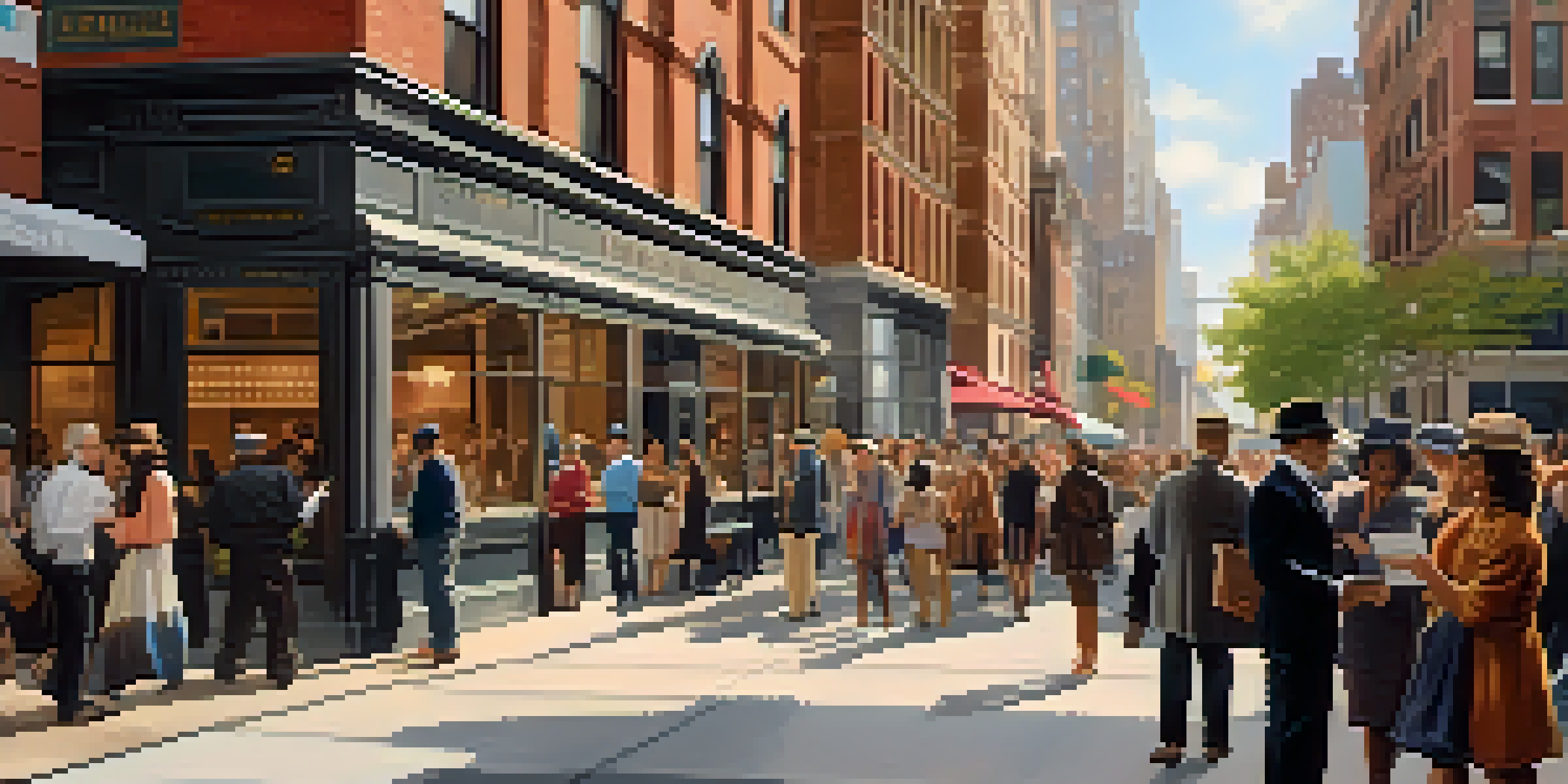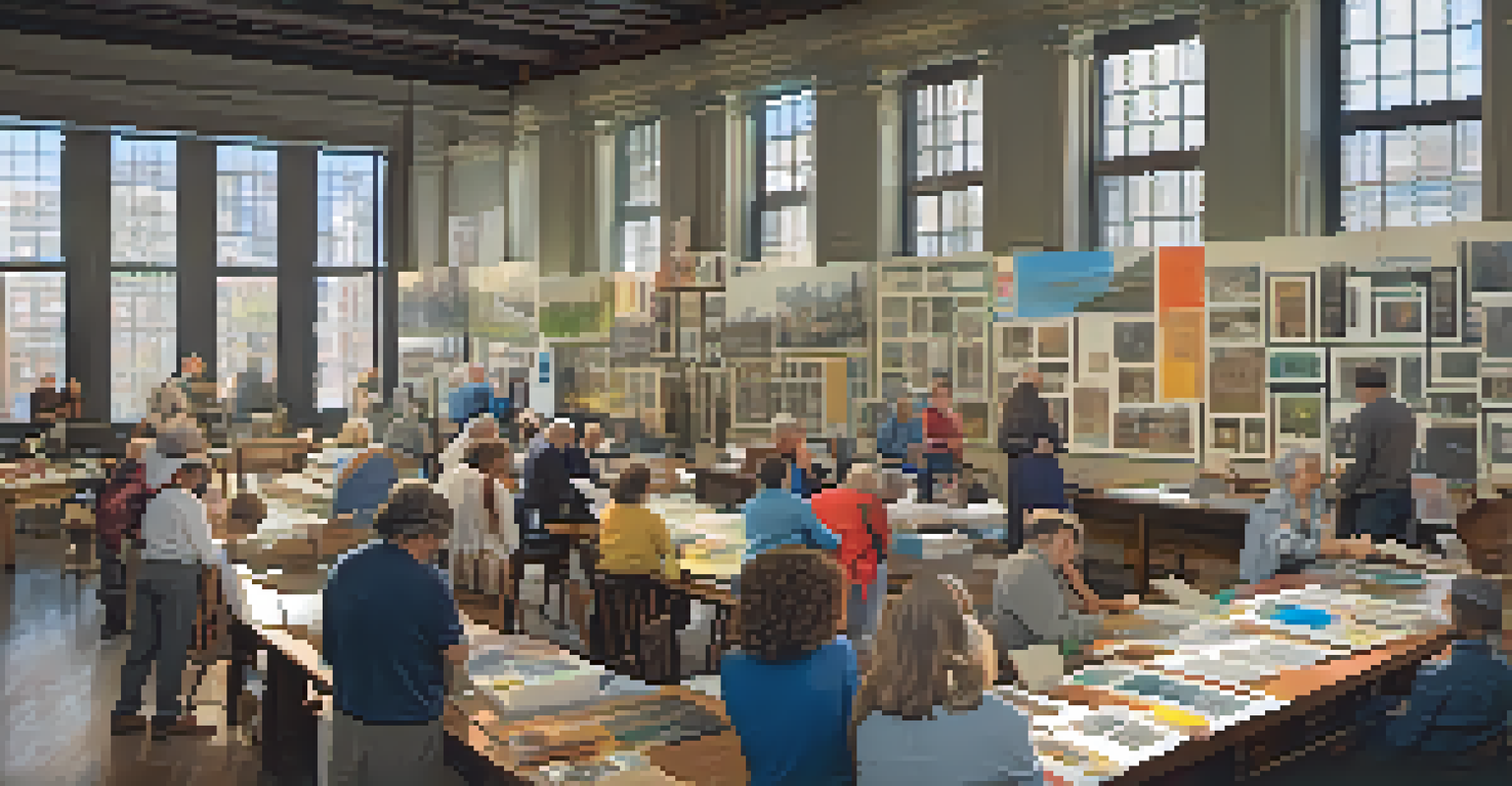Historical Archives: Preserving NYC's Cultural Heritage

The Importance of Historical Archives in NYC
Historical archives serve as the backbone of New York City's rich cultural tapestry. They house documents, photographs, and artifacts that tell the story of the city's diverse communities and significant events. Without these archives, much of NYC's vibrant history would fade into obscurity, leaving future generations with incomplete narratives.
History is not a burden on the memory but an illumination of the soul.
In essence, these archives act like time capsules, preserving the essence of past eras. They allow us to understand how the city evolved, the challenges it faced, and the triumphs that emerged. This preservation is vital not just for historians, but for everyone who wishes to connect with the roots of their community.
Moreover, as NYC continues to grow and change, the role of these archives becomes even more critical. They ensure that as new stories are created, the old ones remain a part of the conversation, enriching our understanding of what it means to live in this dynamic city.
Key Historical Archives in New York City
New York City is home to several prominent historical archives, each offering unique insights into the city's past. The New York Public Library's archives, for instance, boast a vast collection of materials from various eras and communities. Additionally, the Municipal Archives hold vital records that detail the city's governance and development.

Another notable institution is the Museum of the City of New York, which curates exhibitions and collections that celebrate the city's history. These archives not only preserve artifacts but also engage the public through educational programs and exhibitions. They serve as gateways for people to explore and connect with NYC's multifaceted identity.
Archives Preserve NYC's Rich History
Historical archives are essential in maintaining the narratives of New York City's diverse communities and significant events.
Through these key repositories, researchers, students, and curious citizens can delve into the rich narratives that shaped New York City. They provide a treasure trove of information, fostering a deeper appreciation for the city's heritage and the stories of its inhabitants.
Challenges in Preserving NYC's Cultural Heritage
Preserving NYC's cultural heritage comes with its own set of challenges. One major hurdle is the delicate nature of many archival materials, such as old photographs and manuscripts, which can deteriorate over time. Proper conservation techniques and climate-controlled environments are essential to mitigate this risk and ensure that these items endure for future generations.
We do not inherit the earth from our ancestors; we borrow it from our children.
Additionally, funding plays a critical role in the preservation of historical archives. Many institutions rely on grants and donations to maintain their collections and facilities. As urban development continues to evolve, balancing the need for modern infrastructure with the preservation of historical sites becomes increasingly complex.
Lastly, there is the challenge of accessibility and public engagement. While these archives hold invaluable information, making that information accessible to the general public is crucial. Efforts must be made to digitize collections and create outreach programs that encourage diverse communities to explore their heritage.
Digital Transformation of Historical Archives
The digital age has revolutionized how historical archives operate, making it easier to access and share information. Many institutions are now digitizing their collections, allowing people from all over the world to explore NYC's history from the comfort of their homes. This transformation not only broadens access but also preserves the physical items from wear and tear.
Digital archives can include anything from scanned documents to interactive timelines that engage users with multimedia content. This innovative approach creates a more immersive experience, helping users to connect emotionally with the past. By leveraging technology, historical archives can reach a wider audience, fostering a greater appreciation for cultural heritage.
Community Engagement is Crucial
Involving local residents in archival preservation enriches collections and fosters a deeper connection to the city's heritage.
However, the digital shift also presents challenges, such as the need for ongoing funding and technical expertise. Institutions must invest in both infrastructure and training to ensure that digital resources remain current and user-friendly. Balancing traditional methods with modern technology is key to maintaining the integrity of historical archives.
Community Involvement in Archival Preservation
Community engagement is vital for the preservation of historical archives in NYC. Local residents often possess invaluable knowledge and stories that can enrich the collections. By involving community members in the archiving process, institutions can create a more inclusive narrative that reflects the diverse voices of the city.
Workshops, volunteer programs, and public events can encourage community participation in archival projects. These initiatives not only help gather materials but also foster a sense of ownership and pride in the city's history. When people feel connected to their heritage, they are more likely to advocate for its preservation.
Furthermore, partnerships between archives and local organizations can lead to innovative preservation efforts. Collaborations can help raise awareness about the importance of historical archives and inspire collective action to safeguard the city's cultural legacy for future generations.
The Role of Education in Preservation Efforts
Education plays a crucial role in preserving NYC's cultural heritage through historical archives. Schools and universities can incorporate archival materials into their curricula, allowing students to learn about the past firsthand. This experiential learning approach fosters critical thinking and encourages students to engage with history actively.
Moreover, educational programs offered by archival institutions can help demystify the research process. Workshops on how to access and utilize archives empower individuals to explore their family histories or local heritage. By making archives accessible and engaging, educational initiatives ensure that history remains relevant to newer generations.
Digital Transformation Enhances Access
The digitization of archival materials broadens access to NYC's history while also preserving physical documents for future generations.
As students develop a deeper understanding of their city's past, they become more informed citizens who value preservation efforts. This educational framework not only benefits individuals but also strengthens the community's commitment to maintaining its rich cultural heritage.
Future of Historical Archives in NYC
Looking ahead, the future of historical archives in NYC is both promising and challenging. As technology continues to evolve, these institutions will need to adapt to meet the changing needs of their communities. This may involve enhancing digital access while also preserving the physical integrity of their collections.
Additionally, increased collaboration among organizations can lead to innovative preservation strategies. By sharing resources, knowledge, and best practices, institutions can create a robust network dedicated to safeguarding the city's heritage. This collaborative spirit will be vital in addressing the challenges posed by urban development and funding.

Ultimately, the future of historical archives hinges on community engagement and education. As more individuals recognize the importance of preserving NYC's cultural legacy, there will be a growing push to protect these invaluable resources. Together, we can ensure that the stories of our past continue to inspire future generations.